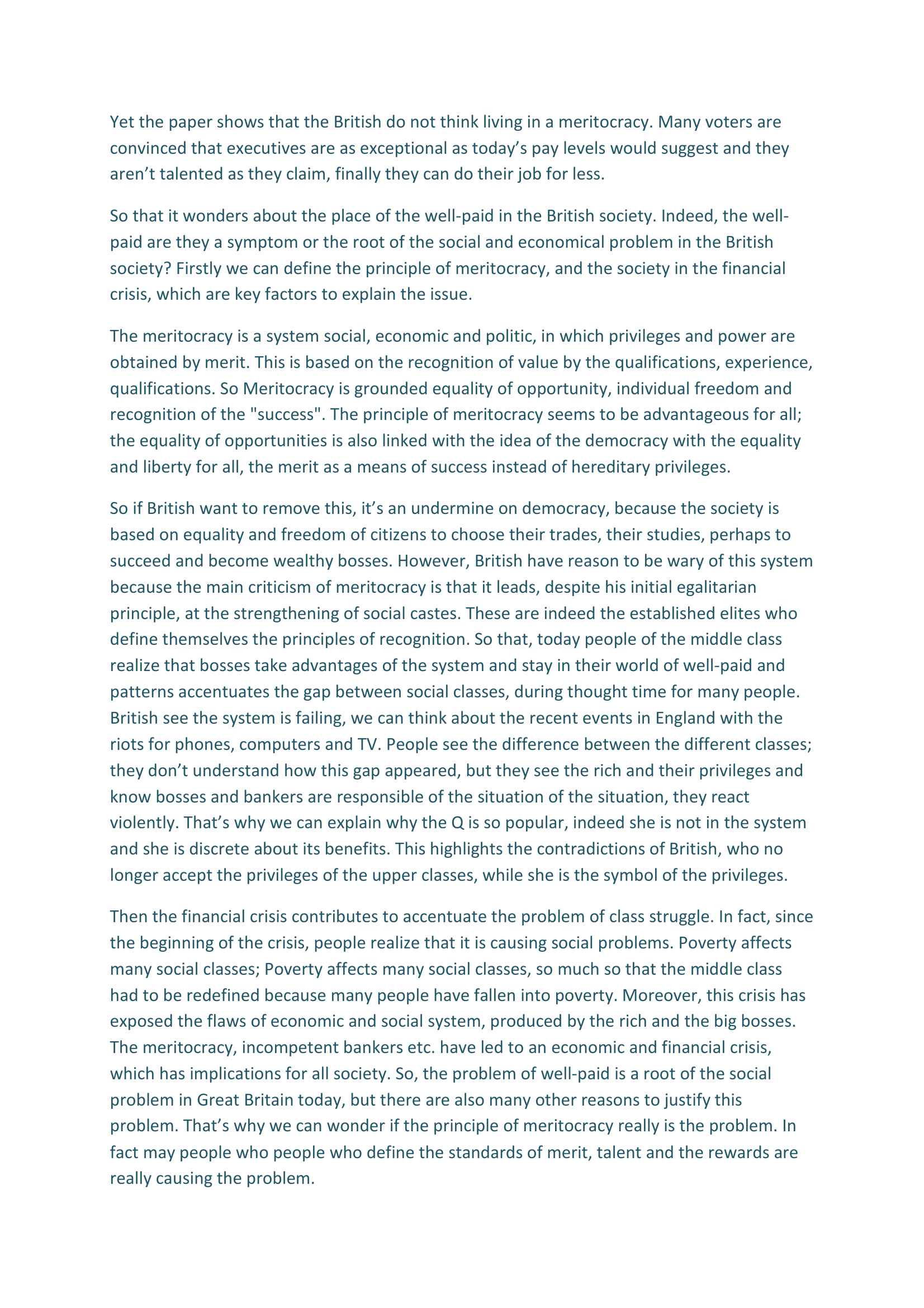The death of meritocracy - Commentaire
Publié le 28/03/2012

Extrait du document
«
Yet the paper shows that the British do not think living in a meritocracy.
Many voters are
convinced that executives are as exceptional as today’s pay levels would suggest and they
aren’t talented as they claim, finally they can do their job for less.
So that it wonders about the place of the well-paid in the British society.
Indeed, the well-
paid are they a symptom or the root of the social and economical problem in the British
society? Firstly we can define the principle of meritocracy, and the society in the financial
crisis, which are key factors to explain the issue.
The meritocracy is a system social, economic and politic, in which privileges and power are
obtained by merit.
This is based on the recognition of value by the qualifications, experience,
qualifications.
So Meritocracy is grounded equality of opportunity, individual freedom and
recognition of the "success".
The principle of meritocracy seems to be advantageous for all;
the equality of opportunities is also linked with the idea of the democracy with the equality
and liberty for all, the merit as a means of success instead of hereditary privileges.
So if British want to remove this, it’s an undermine on democracy, because the society is
based on equality and freedom of citizens to choose their trades, their studies, perhaps to
succeed and become wealthy bosses.
However, British have reason to be wary of this system
because the main criticism of meritocracy is that it leads, despite his initial egalitarian
principle, at the strengthening of social castes.
These are indeed the established elites who
define themselves the principles of recognition.
So that, today people of the middle class
realize that bosses take advantages of the system and stay in their world of well-paid and
patterns accentuates the gap between social classes, during thought time for many people.
British see the system is failing, we can think about the recent events in England with the
riots for phones, computers and TV.
People see the difference between the different classes;
they don’t understand how this gap appeared, but they see the rich and their privileges and
know bosses and bankers are responsible of the situation of the situation, they react
violently.
That’s why we can explain why the Q is so popular, indeed she is not in the system
and she is discrete about its benefits.
This highlights the contradictions of British, who no
longer accept the privileges of the upper classes, while she is the symbol of the privileges.
Then the financial crisis contributes to accentuate the problem of class struggle.
In fact, since
the beginning of the crisis, people realize that it is causing social problems.
Poverty affects
many social classes; Poverty affects many social classes, so much so that the middle class
had to be redefined because many people have fallen into poverty.
Moreover, this crisis has
exposed the flaws of economic and social system, produced by the rich and the big bosses.
The meritocracy, incompetent bankers etc.
have led to an economic and financial crisis,
which has implications for all society.
So, the problem of well-paid is a root of the social
problem in Great Britain today, but there are also many other reasons to justify this
problem.
That’s why we can wonder if the principle of meritocracy really is the problem.
In
fact may people who people who define the standards of merit, talent and the rewards are
really causing the problem..
»
↓↓↓ APERÇU DU DOCUMENT ↓↓↓
Liens utiles
- Commentaire sur l'ouvrage de Quobna Ottobah Cugoano : Thoughts and Sentiments on the Evil of Slavery
- MORT DANS L’APRÈS-MIDI [Death in the Afternoon]. (résumé et analyse) Ernest Hemingway
- MORT DANS LA FAMILLE (Une) [A Death in the Family]. (résumé et analyse) James Agee
- Commentaire affiche film The Shining
- Edgar Allan Poe: The Mask of the Red Death (Sprache & Litteratur).




